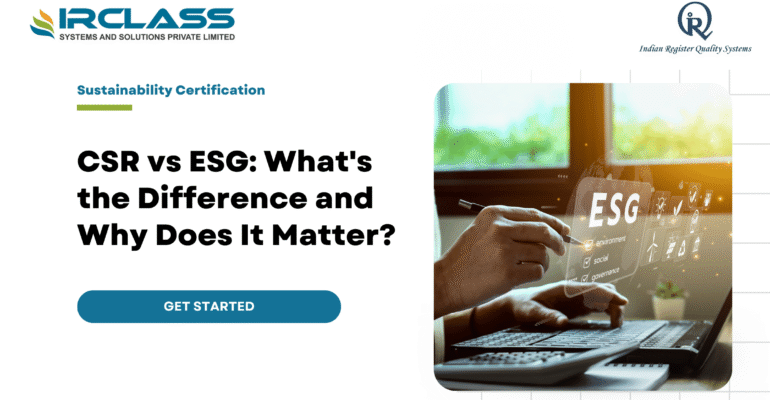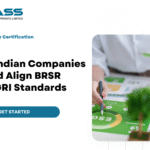CSR Reporting vs ESG Reporting: What’s the Difference and Why It Matters
July 25, 2025 2025-07-31 11:34CSR Reporting vs ESG Reporting: What’s the Difference and Why It Matters

CSR Reporting vs ESG Reporting: What’s the Difference and Why It Matters
Firms desire to demonstrate that they are responsible. They desire to appear good to the customers, investors and employees. Two of the ways they attempt to do that are CSR and ESG. Yet they are not identical. These words are usually used interchangeably, yet they are not synonymous. The distinction is important to businesses, investors, and stakeholders.
What is CSR Reporting
CSR is the abbreviation of Corporate Social Responsibility. CSR reporting refers to the situation where a company reports on what it is doing to become a good corporate citizen. This normally involves social, environmental and ethical projects.
It is all about good doing. CSR includes such things as:
- Charitable donations
- Community work and volunteering
- Employee well-being
- Ethical sourcing
- Less waste and pollution
CSR reports are qualitative in nature. They explain activities and initiatives. The idea is to gain trust and demonstrate that the company is not only interested in profits. It is generally directed to the general population, workers, and occasionally regulators.
What is ESG Reporting
ESG stands for Environmental, Social, and Governance. ESG reporting is about data. It tracks how a company performs in these three areas using measurable indicators.
The goal is to provide investors with information to assess risk and long-term value. ESG reports include:
- Carbon emissions
- Water and energy usage
- Gender and diversity ratios
- Supply chain risk
- Board structure
- Executive pay alignment with sustainability targets
This is not just about values. It is about performance. ESG is designed to help financial stakeholders understand how well a company is managing non-financial risks.
The Main Differences
1. Scope and Focus
CSR is broad and value-based. It shows a company’s commitment to social good.
ESG is focused and data-driven. It shows a company’s performance in key areas that affect long-term value.
CSR might include starting a community recycling program. ESG would report how much waste was reduced and how that compares to industry benchmarks.
2. Purpose and Audience
CSR speaks to the public. It builds brand image and trust.
ESG speaks to investors. It helps them decide where to put their money.
CSR is good for PR. ESG is good for business strategy and risk management.
3. Measurability and Standards
CSR reporting is often anecdotal. It tells stories.
ESG reporting uses hard data. It follows frameworks like GRI, SASB, and TCFD. These allow investors to compare companies side by side.
CSR might say a company promotes work-life balance. ESG would show employee turnover, retention rates, and engagement metrics.
4. What Drives It
CSR is driven by internal values. It is about doing what feels right.
ESG is driven by external pressure. Investors, regulators, and markets demand accountability.
CSR started as a moral decision. ESG is now a financial necessity.
Why the Difference Matters
It matters because mixing them up leads to confusion. Companies need to understand which one to focus on depending on the goal.
For Businesses:
CSR helps build culture and employee loyalty. ESG brings in investors and prepares the company for future regulations. Both matter, but they serve different purposes.
For Investors:
Investors want data. ESG helps them assess risk, sustainability, and long-term financial health. CSR won’t give them what they need to make decisions.
For Stakeholders:
Customers and communities want to know that companies care. CSR helps tell that story. ESG shows that it’s not just talk, but measurable action.
CSR Is the Philosophy. ESG Is the Proof.
CSR is a company saying, “We care.” ESG is a company showing, “Here’s how we’re doing.” One is about intention. The other is about accountability.
You can have CSR without ESG, but it’s just storytelling. You can’t have strong ESG without the foundation of CSR, because you need values to guide what you measure.

What Companies Need to Do Now
- Understand the audience. Use CSR to speak to communities and customers. Use ESG to talk to investors.
- Track what matters. Start measuring ESG data even if you already have CSR programs.
- Adopt frameworks. Pick standards like GRI, SASB, or TCFD. These help build credibility.
- Align the two. Make sure your CSR values match your ESG actions. If you say diversity matters, show the numbers.
- Get ready for regulation. ESG reporting is quickly becoming mandatory in many countries.
The Role of Regulation in Pushing ESG Forward
Governments and regulators are now stepping in. ESG is no longer just a nice-to-have. In many industries, it’s becoming a requirement. Global bodies like the European Union have introduced regulations such as the Corporate Sustainability Reporting Directive (CSRD). India has introduced the Business Responsibility and Sustainability Reporting (BRSR) framework. These are pushing companies to disclose specific environmental and social metrics.
This is a major shift from the voluntary nature of traditional CSR. Regulators now want measurable outcomes. Companies that fail to report ESG data may face fines, lose investor trust, or struggle to access capital. Reporting is also being tied to tax benefits and public procurement eligibility.
This means companies can’t just write feel-good stories anymore. They need real numbers. They need data they can stand behind. ESG helps ensure that the business is not only doing good but also protecting itself against future legal, environmental, and reputational risks.
Companies that get ahead of these requirements will have a competitive advantage. Those that don’t will be left behind. Regulation has moved ESG from marketing to mandatory, and businesses need to act now.
Why ESG Brings More Value Than CSR Alone
CSR shows the world that a company wants to do the right thing. That matters. But ESG adds a layer that CSR cannot deliver—proof. Investors, banks, insurers, and regulators want evidence. They want to know if a business is future-proof. ESG gives them that.
It’s not about reporting for the sake of it. ESG data can uncover risks before they become problems. For example, high energy use today may become a financial liability tomorrow if carbon taxes increase. A lack of diversity today could turn into a talent drain and reputational risk later. Good ESG practices improve decision-making, reduce costs, and increase access to funding.
CSR helps a company look good. ESG helps a company stay strong. It connects non-financial factors to financial outcomes. That’s why ESG is now part of many investment strategies, credit scoring models, and supply chain audits.
This is where companies need to shift their mindset. CSR is not enough anymore. It’s a part of the picture, not the full story. ESG brings structure, benchmarks, and accountability. In today’s economy, that brings more long-term value than branding alone ever could.
Where IRQS Fits In
IRQS collaborates with companies to ensure that they are doing both CSR and ESG right. They give confirmation and security to sustainability reporting. They assist businesses to conform to global standards such as ISO 14067 on carbon footprint and frameworks such as BRSR on sustainability reporting in India.
IRQS is a global organization with more than 5000 certified clients, and it provides the tools, training and credibility that companies require to remain compliant and competitive. IRQS is the partner to rely on in case any organization wants to transition between good intentions and proven impact.





